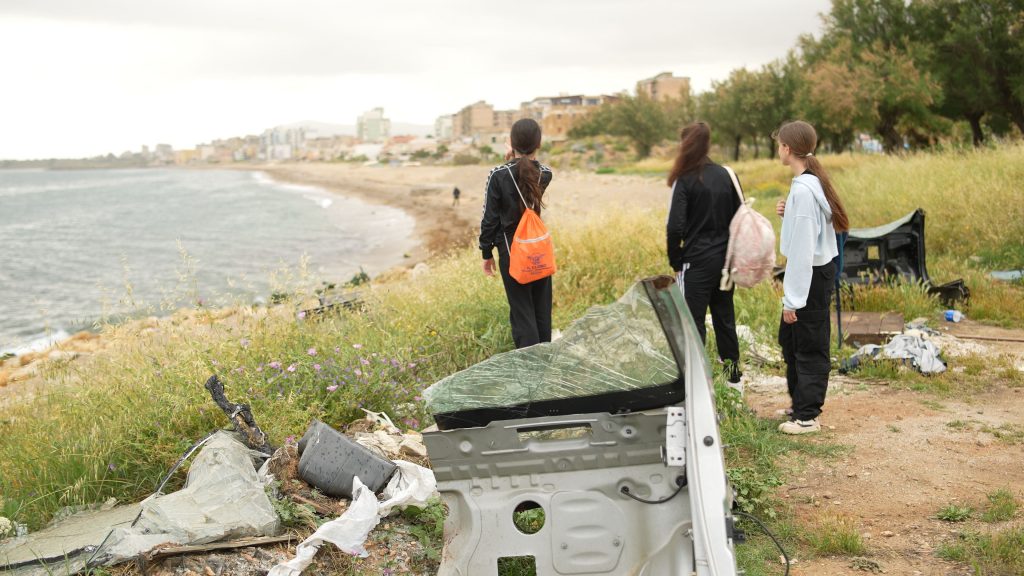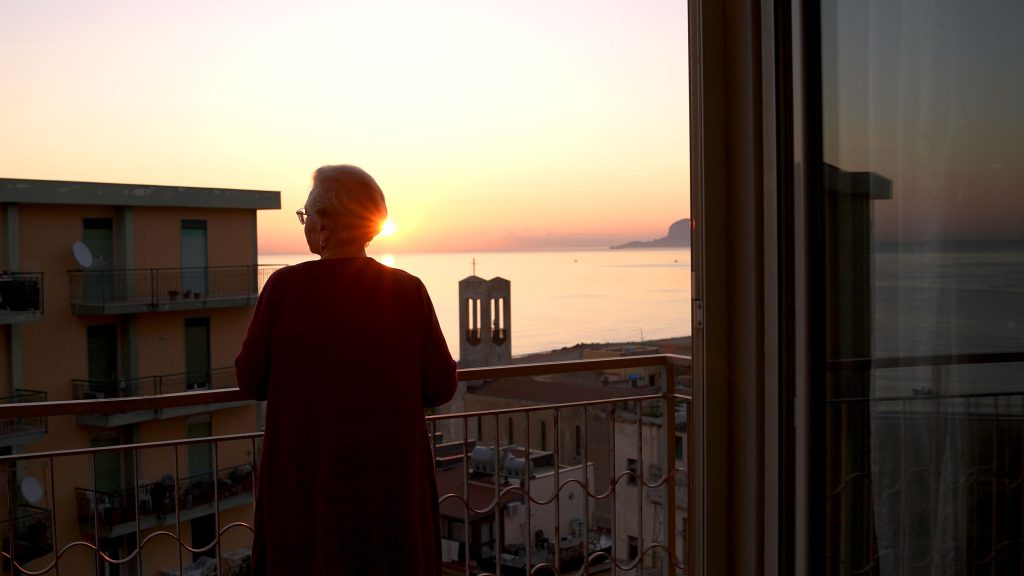Irene Coppola began her artistic research on the southeast coast of Palermo in 2017 in collaboration with the Eco-Museo Mare Memoria Viva. Since then, she has rediscovered unfinished and apparently abandoned places such as the Romagnolo seafront and the amphitheatre in Acqua dei Corsari called ‘Teatro del Sole’. She began to familiarise herself with the materials that had been abandoned as rubbish on the coast for decades and that now, in layers, reflect the neighbourhood’s history and the urban disaster caused by abusive housing construction and speculation known as “Sacco di Palermo”. During her walks on this negated beach, she made unexpected encounters with people who use this seemingly uninhabited place: sunbathing, training horses, playing cards, making bonfires or even film screenings.

For Between Land and Sea, Irene Coppola builds a modular sculpture made of the firework discards that she found on the beach and recalls the local ways to celebrate collective events of different types. On the hill, the so-called « Mammelloni » behind the Ecomuseo, the sculpture FIRE-WORKS becomes an improvised meeting place during the festival. The social platform will host an assembly on Sunday evening, where Coppola will present and discuss the interim results of her study with the inhabitants of the area, the citizens of Palermo, local experts and the international audience.

« Mia nonna mi ha detto che dopo la seconda guerra mondiale hanno buttato molte cose a mare, soprattutto case… »
In May 2023, Irene Coppola in co-direction with filmmaker Ruben Monterosso began shooting their documentary MAMMELLONI, a portrait of the main coast of Palermo through its inhabitants. They allowed us to print the transcriptions of some of the first encounters and preparatory meetings in our catalogue.
[ Elvira_Romagnolo 26.04.2023 ]
Elvira: It’s also nice that I see here (because we’re not all that ….) I see that on these feast days, like April 25th, people come for picnics, and sometimes it’s even nice people who eat, make barbecues, and, take away the filth. But I’m glad, joy! That’s fine, that’s fine.
The important thing is that they have respect for the environment. Then there is also in summer someone who comes to sing serenades with an accordion, they sit on the benches and sing and play, it’s characteristic and very pleasant.
Ruben: We tell you this. We met a group of young girls who came here accompanied by their mothers. And these young girls do exactly what you say, they come here because they have nowhere else to meet young people. They go for their walks, they play, and so on and so forth, and they always take a little bag with them, and where they are, while they are playing, they clean up.
Irene: 13 years old they have…they want to take care of their territory because they say ‘We live here’.
Ruben: « it’s ours! »
Elvira: Of course, this is the garden and the terrace, this is our going outside.
Irene: Besides, in Palermo, it’s not like there are so many public spaces, right? This is too important a public space.
Elvira: But I tell you, I’m very pleased…there’s the old man, there’s the child, there’s the young man who’s just married, so…these large families that get together: the mother, the son-in-law, the daughter-in-law, the mother-in-law, and they make a little table… Well, they make barbecues, but I’m pleased, why would it bother me if they’re grilling over there? […]
Irene: Let’s have this meeting before you leave, shall we? Are you part of this group?
Elvira: Let us try, let us try. I’d like to be able to give this place a voice so that, as I was saying, it can go back to the way it used to be, because here it was very famous, darling, there was no Mondello to hold it up. Excuse me? There was no Model that held up!
[ Giulia_Romagnolo 20.04.2023 ]
Giulia: […] He says that that rubbish is in the part of the maritime domain and Rap can’t get its hands on it. But can’t we pretend it’s nowhere near here? But crazy things, crazy things! […]
I always wanted to go down to the sea, because there we have the Pietra Alba, which was the famous rock in its time because it was…. the sea reached as far as the road, so to swim to the Pietra Alba you had to be a good swimmer, so, to tell you the truth, the first time I managed to swim to the Pietra Alba I said ‘That’s it! Now I’m a good swimmer’.
Irene: But why is it called Pietra Alba?
Giulia.: So in the old days this area was called ‘Mustazzola’ because there are these flat rocks like a musstazola and that rock I think was called Gaipa rock, I don’t know why. The person who renamed it Pietra Alba was my father, but my father was a poet, writer, painter […].
And he also wrote in another poem ‘in my veins flows seaweed blood’, so in his veins and consequently in mine and my brother’s, there is always this seaweed blood. My blood was green, not blue, green!
Irene: And you as children were practically always there (at the plant)…
Giulia: […] when I was little, I was naughty, my brother was good, quiet, I was the opposite, so I was always getting into trouble, making trouble
My mother, poor thing, always had to keep an eye on me. When she took me to the factory, she could rest easy, even if she didn’t follow me, because the whole factory there was protective of me.
Irene: It was like one big family!
Giulia: It was like one big family. […]
I’m going to show you something now because it’s too cool, it’s a photo from when I was a child. But at the factory. I’ll show you my face!
[ Asia, Erika, Maira_Sperone 07.05.2023 ]
Maira: That’s why they grill in summer.
Erika: Ah yes there are the huts!
Asia: In the summer they have abusive huts
Maira: They come to sleep here with tents
Asia: If you have to do something like that, do it in Mondello, not here!
Ruben: Eh in Mondello they don’t allow it….
[…]
Maira: You can find a lot of things here! Further on there is like a piece of pavement…
Irene: You mean the one with the coloured tiles?
Maira: No no it’s really a pavement, but in my opinion older…
Marika: My grandmother once told me that after the Second World War they threw many things into the sea, especially houses…
Irene: All the remnants of these bombings…
Maira: One also finds dolls, shoes… shoes everywhere!
Irene: The most beautiful thing you found?
Maira: Maybe the magnet…
Marika: …that I took, I still have it at home on the fridge.
Irene: And what was printed on it?
Tutte: It was a lighthouse!
Artist: Irene Coppola / Film directors: Irene Coppola, Ruben Monterosso / Curation: Eva-Maria Bertschy
Production: Letizia Gullo
In collaboration with Ecomuseo Mare Memoria Viva
With the support of:

